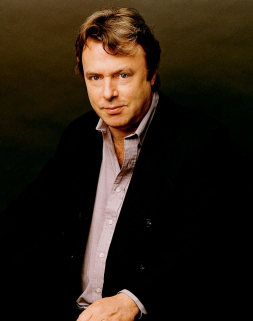
NEW YORK (BP) — Author and speaker Christopher Hitchens, a leader of an aggressive form of atheism that eventually was dubbed “New Atheism,” died Thursday from pneumonia, a complication of his oesophageal cancer. He was 62.
Hitchens’ interests were varied and he wrote extensively about politics, but it was his outspoken, confrontational words on God’s existence that caught the attention of the Christian community. Hitchens and other members of the New Atheism movement — such as Richard Dawkins and Sam Harris — went beyond the centuries-old arguments against God and religion. Hitchens wasn’t simply arguing against God’s existence; he said that the world’s greatest problems were caused by religion. Society, he argued, should cleanse itself of all religious beliefs. Hitchens’ most famous book on the subject summed up his thoughts in the title: “God is Not Great: How Religion Poisons Everything.”
He once said of families who raise their children to believe in God: “How can we ever know how many children had their psychological and physical lives irreparably maimed by the compulsory inculcation of faith?”
He wrote that religion was “violent, irrational, intolerant, allied to racism and tribalism and bigotry, invested in ignorance and hostile to free inquiry, contemptuous of women and coercive toward children.”
Hitchens, who had dual British and U.S. citizenship, regularly took part in debates over God’s existence. For example, in November 2010 he debated Southwestern Baptist Theological Seminary professor William Dembski and in April 2009 he sparred with Christian apologist William Lane Craig.
After Hitchens’ death, Christian leaders were mostly gracious in their response.
“When my dad died, Chris Hitchens had horrible things to say,” Jonathan Falwell, pastor of Thomas Road Baptist Church in Lynchburg, Va., wrote in a Tweet. “All I can say is that I’m praying for Mr. Hitchens’ family in their loss.”
Rick Warren, pastor of Saddleback Church in California, said Hitchens was a friend.
“I loved & prayed for him constantly & grieve his loss. He knows the Truth now,” Warren wrote in a Tweet.
Pastor and author Douglas Wilson, who participated in a series of written debates with Hitchens over God’s existence that were put in book form, wrote a tribute to Hitchens at ChristianityToday.com.
“Christopher knew that faithful Christians believe that it is appointed to man once to die, and after that the Judgment,” Wilson wrote. “He knew that we believe what Jesus taught about the reality of damnation. He also knew that we believe — for I told him — that in this life, the door of repentance is always open.”
But Hitchens tried to explain away any potential death-bed conversion, Wilson said.
“Christopher was worried about this, and was afraid of letting down the infidel team,” Wilson wrote. “In a number of interviews during the course of his cancer treatments, he discussed the prospect of a ‘death bed’ conversion, and it was clear that he was concerned about the prospect. But, he assured interviewers, if anything like that ever happened, we should all be certain that the cancer or the chemo or something had gotten to his brain.”
After Hitchens died, Southern Baptist Theological Seminary President R. Albert Mohler Jr. also commented, saying in a Tweet: “The death tonight of Christopher Hitchens is an excruciating reminder of the consequences of unbelief. We can only pray others will believe.” Mohler added, “The point about Christopher Hitchens is not that he died of unbelief, but that his unbelief is all that matters now. Unspeakably sad.”
Ed Stetzer, vice president of research and ministry development at LifeWay Christian Resources, wrote in a blog post that for many people, “Hitchen’s passing will lead to stirring up old debates and old bruises.” Yet Christians should react with compassion, Stetzer said.
“I would like to see the dialogue of Christian apologetics move from Hitchens, Dawkins, and Harris into our houses, diners, and local community centers,” Stetzer wrote. “The AP news wire will not be abuzz with the passing of the atheist in your neighborhood, but your heart ought hurt for them. I am grateful for evangelical scholars who have engaged New Atheism with the level of intellectual commitment the movement deserves. But for most of us, we ought to concern ourselves with and grieve over the debates that war in the minds of our families, friends, and coworkers.”
–30–
Michael Foust is associate editor of Baptist Press.
Get Baptist Press headlines and breaking news on Twitter (@BaptistPress), Facebook (Facebook.com/BaptistPress) and in your email (baptistpress.com/SubscribeBP.asp).

















